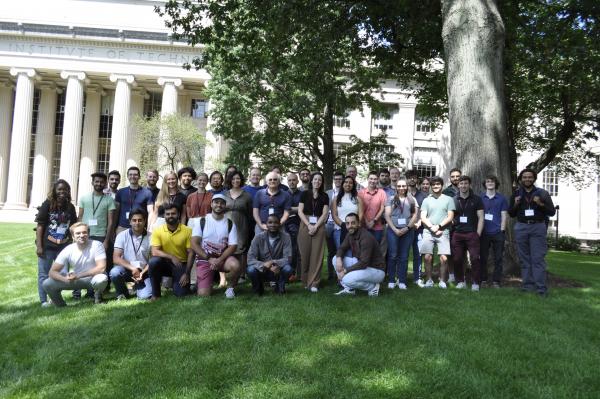
CPS-FR 2023 Cohort
Jenn Scarborough
November 16, 2023
In August the Plasma Science and Fusion Center (PSFC) hosted it’s 4th annual Computational Physics School for Fusion Research (CPS-FR). The one week intensive course at the end of the summer aims to equip graduate students and early career researchers with cross-disciplinary skills by strengthening their understanding of computer science.
The school was founded in 2019 by the Disruption Team Group Leader Dr. Cristina Rea and at the time graduate student Francesco Sciortino*, with the support of Prof. Anne White and Dr. Paul Bonoli. It is now presented annually by Drs. Rea and Bonoli and Jessica Coco and hosts students from about 20 different institutions globally.
The program focuses on four pillars of instruction: high performance computing architectures, parallel programming, computational statistics, and machine learning.
“My whole postdoc was about this cross-cutting application of ML into fusion, and I always felt like I was trying to bridge over techniques from another domain. […] Francesco felt the same about being able to launch simulations at scale and parallelize code. We both had this challenge of learning and instructing ourselves on techniques from other fields and bringing them into fusion,” reflected Dr. Rea.
The course aims to cover this training gap for students and postdocs, rather than forcing them to rely on self-instruction. Through a combination of lectures, guided discovery and hands-on applications, students are able to connect the pillar topics to their own research. The format also provides opportunities to network with and learn from both fellow participants and invited lecturers from the Fusion expert community.
Enrolled participants were invited to share their work during an evening poster session at the PSFC. 15 posters were presented, with over 40 attendees at the event.
“My PhD project focuses on experimental data analysis of boundary turbulence of the Alcator C-Mod tokamak. As I work with Python daily, I applied to the summer school to be introduced to new ideas and approaches in visualizing statistical properties of boundary turbulence and making my algorithm faster. The sessions provided a great introduction to various computational techniques that will be useful for my future research,” says participant Aurora Helgeland, a PhD student at The Arctic University of Norway.
In the future, Dr. Rea hopes to see the program continue to grow and to expand the access for international participants. “Last year we were able to provide some travel support for participation, and it really made an impact in broadening attendance to participants that wouldn’t otherwise have the means to get to Cambridge. […] If we can add more fellowships or means of support for students, including from developing countries, that would be great.”
The 5th annual CPS-FR will be presented in August 2024. Applications for admission will open in May of 2024.
* Dr. Sciortino is now the Co-Founder & CEO of Proxima Fusion.